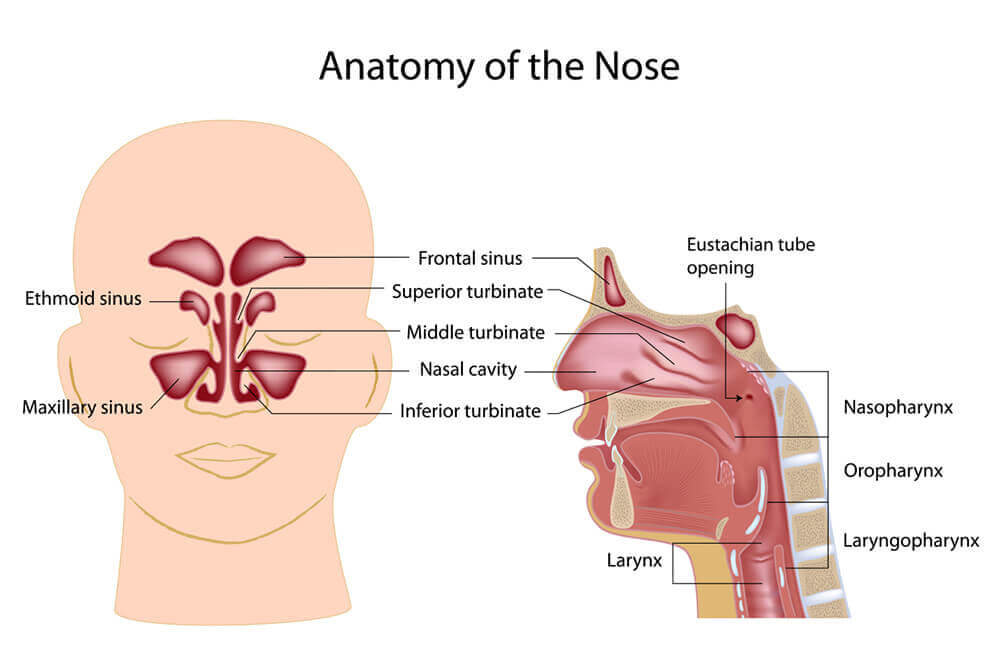Nose & Sinus Disorders
There are a variety of reasons you may need to see an ENT specialist. Here are some of the more common nose and sinus-related symptoms and disorders that ENT & Sleep Specialists in Clinton, MD, can diagnose and treat.

Allergic Rhinitis
Allergies can manifest in many ways. Symptoms often involve the skin, eyes, and sinuses.
Allergic rhinitis refers to these symptoms when they show themselves as a runny, itchy nose and frequent sneezing. Triggers for allergic rhinitis can come from any allergen.
The most common kinds of allergens are pollen, dust, and dander. These symptoms, along with others, can often be treated using over-the-counter allergy medication in the form of antihistamines.
In cases where antihistamines aren’t effective, your doctor or allergist may prescribe immunotherapy. Immunotherapy can be provided through injection or oral medication.
Deviated Septum
The septum is the part of your nose that separates each nostril. If you have a deviated septum, it means that it’s off-center.
You may have a deviated septum due to injury, but some people are also born with one. Sometimes, a deviated symptom presents no issues.
But having one can also cause frequent nosebleeds, snoring, and sinus infections, among other symptoms. When a deviated septum is causing too many health issues, you have it corrected with a surgical procedure called a septoplasty.
Nose Bleeds
Also called epistaxis, nose bleeds are very common. They’re usually caused by dry air.
Most people get nose bleeds sometimes, and some have them more frequently than others. But frequent nosebleeds can indicate a more significant health issue, like a deviated septum or a particularly severe injury.
If you have more frequent nosebleeds, you should see an ENT so they can figure out what’s causing your nose bleeds.
If you have a nosebleed that doesn’t stop after pinching your nostrils for twenty minutes, or you have trouble breathing, seek emergency medical assistance.
Nasal Congestion
Congestion is a common cold symptom. It can also indicate a deviated septum, sinus infection, or nasal polyps. For mild cases of nasal congestion, you can use over-the-counter antihistamines or decongestants.
If you’re congested for more than ten days, you should see an ENT. Having nasal congestion that doesn’t get better after this time might indicate a more serious health problem.
Nasal Polyps
Nasal polyps are small, benign growths that grow in the nasal cavity. They can cause sinus pain, loss of smell, and discharge.
If you experience these symptoms, see an ENT. If you’re diagnosed with nasal polyps, they’re usually easily treated using a steroid spray.
Post-nasal Drip
Post-nasal drip occurs when mucus drains down the back of the throat. It’s easy to tell if you have mucus in your throat, as it will feel lumpy, sore, and you’ll have trouble swallowing.
Post-nasal drip is a symptom of several conditions, including having an allergic reaction, sinus infection, or gastroesophageal reflux.
Treatment varies depending on the cause, but you can treat mild cases with over-the-counter medication, such as antihistamines and antacids. Prescription drugs, like antibiotics, may be needed in the case of an infection.
Seasonal Allergies
One of the most common allergens is pollen. Since pollen is abundant in the air during the spring, you’ll often hear spring called allergy season.
Some people also experience allergies in the fall. Seasonal allergies, also called hay fever, can include allergic rhinitis.
The best treatment for seasonal allergies is the same as it is for any other allergy. This includes avoiding the allergen that creates the allergic reaction, taking antihistamines, and if symptoms continue, seeing a specialist.
They can have you start immunotherapy. Immunotherapy may help reduce your allergic reaction or response to your allergies.
Sinus Infections and Sinusitis
The lining of the inside of your sinuses, located in your nose, can become inflamed for various reasons. Sinusitis, or a sinus infection, can cause post-nasal drip, sinus pain, discharge, and congestion.
Treatment requires diagnosis to pinpoint the cause of the infection. Bacterial infections are a common cause that you can treat with antibiotics. You can also manage the symptoms by using over-the-counter medication like decongestants.
Snoring
Snoring is extremely common. It happens when the tissues in your airway vibrate in the back of your throat.
It may seem like occasional snoring isn’t a serious concern, but it can be a sign that something isn’t right or a precursor to a more severe issue.
If you snore a lot, you should see an ENT. The issue may be something simple, like a deviated septum. But it may also be sleep apnea, which can be dangerous when left untreated. It’s best to see a professional about your snoring to receive the proper diagnosis and treatment.
Tonsillitis
The tonsils, which are lymph nodes in the back of the mouth and the top of the throat, can become inflamed due to bacterial or viral infection, much as the sinuses can. This is referred to as tonsillitis.
Tonsillitis can cause fever, trouble swallowing, and a sore throat. One common cause of tonsillitis is strep throat.
Whenever you have a sore throat, it’s best to see a doctor so they can diagnose the infection and prescribe antibiotics as needed. When a patient has tonsillitis too frequently, they don’t respond to antibiotics, or the tonsils get too large, making it harder to breathe at night.
The tonsils may need to be removed through a surgical procedure called a tonsillectomy. Both children and adults can have a tonsillectomy.
Even if you have your tonsils removed, your body will still help protect your body from infections since you can accomplish this in other ways.
It’s essential to see an ENT if you find you or a loved one struggling with any of the above nose and sinus disorders. Schedule a consultation at ENT & Sleep Specialists in Clinton, MD, today!





